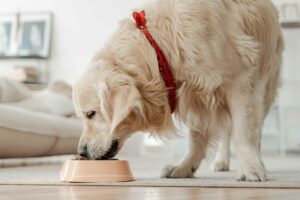Rapid and drastic changes in the dietary regimen of dogs have a significant and rapid impact on the fecal microbiota and microbial metabolites. This is the finding of a study just published in Animal Microbiome .
Diet and gut microbiota
Diet significantly influences both microbial diversity and gut microbiota function.
Although previous studies have already evaluated the effect of some dietary interventions on the gut microbiota, changes in the gut microbiota, microbial functions, and metabolite profiles post dietary interventions have been little explored, as well as the time required for these changes to reach a steady state and their impact on host physiology are largely unknown .
The macronutrient content of the diet is one of the key factors in shaping the composition, metabolic activity, and diversity of the fecal microbiota. Among the macronutrients, fiber and carbohydrates are definitely the most studied.
Dietary fibers are able to increase intestinal production of short-chain fatty acids (SCFA) and microbial metabolic activity, as well as increase the proliferation of bacteria belonging to the phylum Firmicutes and other saccharolytic taxa.
The amount of protein and fat can also influence the composition of the fecal microbiota. High-protein diets contribute to anincrease in putrefactive metabolites (ammonia, indoles, amines) that consequently result in a high prevalence of Fusobacteria and Proteobacteria.
High-fat diets, on the other hand, can increase fecal bile acid concentrations and have a negative impact on Prevotella and xylan fermentation.
Changes in gut and fecal microbiota
For the main purpose of determining how quickly changes in fecal microbial taxa, gene content and metabolites occur and stabilize in dogs undergoing a drastic dietary change, and to describe what those changes are, a group of researchers from the University of Illinois examined Fecal samples from 12 healthy adult Beagles (age: 5.16 ± 0.87 years, body weight: 13.37 ± 0.68 kg) using a Crossover study design.
All dogs were fed a kibble diet (control) from day 1 to day 14 , and from day 15 to day 27 they were fed the same diet supplemented with fiber (HFD) or a protein-rich diet (CD) .
A secondary objective of the research was then to identify correlations between fecal bacterial taxa and fecal metabolite concentrations.
The results of the study
The results showed that following the abrupt alteration of the dietary regimen there is a rapid change and stabilization of the dogs’ fecal characteristics: metabolites, microbial diversity, taxa and gene content.
In general, substantial changes occurred within a few days of the diet change: analyses accurately differentiated the microbiota of dogs fed different diets after only 2 days.
The rate at which stability was achieved took a few more days and depended on the outcome (taxa, gene abundance or metabolite shift) and the diet consumed, but usually within 6-10 days.
Despite the small differences that occurred between the results, our data show that fecal characteristics, metabolites, and microbial diversity, taxa, and gene content are all stable within 2 weeks after a change in diet.
Levels of acetate, propionate, and total short-chain fatty acids in feces increased after switching to HFD, while isobutyrate, isovalerate, total branched-chain fatty acids, phenol, and indole increased after consumption of the CD diet.
Under the HFD regime, moreover, the dominant bacterial phyla were Firmicutes, Proteobacteria e Actinobacteria. These changes in the diversity and composition of the gut microbiota were also accompanied by an increase in sucrose metabolism, fatty acid biosynthesis, and the metabolism of sugars, amino acids, and nucleotides. During the transition to CD, however, there was an increase in inositol phosphate and sulfur metabolism.
Conclusions
Sampling and characterization of the intestinal and fecal microbiota of dogs–following drastic and abrupt dietary changes–has, therefore, made it possible to identify the main relationships between microbiota and metabolic profiles, allowing identification of possible optimal treatment.
Reference
Lin CY, Jha AR, Oba PM, Yotis SM, Shmalberg J, Honaker RW, Swanson KS. Longitudinal fecal microbiome and metabolite data demonstrate rapid shifts and subsequent stabilization after an abrupt dietary change in healthy adult dogs. Anim Microbiome. 2022 Aug 1;4(1):46. doi: 10.1186/s42523-022-00194-9. PMID: 35915514; PMCID: PMC9341101.







